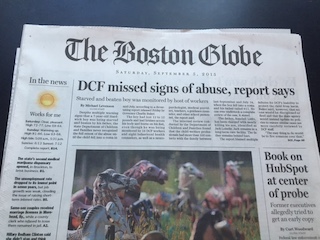Boston Globe front page HubSpot article lacks actual news
 Here’s what I expect from a major newspaper: news. That is, reporting on things that are new. When it comes to sensational headlines about HubSpot, the Globe appears to have forgotten about the “new” part.
Here’s what I expect from a major newspaper: news. That is, reporting on things that are new. When it comes to sensational headlines about HubSpot, the Globe appears to have forgotten about the “new” part.
Like many of you, I’ve been following the titillating saga of the executives that left HubSpot because, allegedly, they used illegal tactics to try to procure the manuscript for Dan Lyons’ upcoming book about his experience at the company. I know nearly everybody involved here, including Dan, the HubSpot founders, and the executives who left, and I’m eager to hear what actually happened. The Boston Globe reported the story on July 29 and followed up on subsequent days.
The picture you see here is the front page of The Boston Globe for September 5. A prominently featured article, “Book on HubSpot at center of probe,” begins like this:
Federal law enforcement officials have opened a criminal investigation into alleged attempts by former HubSpot Inc. executives to obtain a pre-publication draft of a book about the Cambridge company, according to people with knowledge of the matter.
An assistant US attorney in Boston and an FBI cybercrimes agent are working on the case, the people said.
Unfortunately, that’s the extent of the news: the start of a criminal investigation. It’s followed by a non-statement about what might or might not be happening from anonymous sources (hedges in bold italic):
The probe is at a preliminary stage and it isn’t clear whether criminal charges could result, said the people, who asked not to be identified because they weren’t authorized to discuss the matter.
The rest of the article is 571 words rehashing previously published material about the book, HubSpot, and the FBI.
Why publish this one little fact on the front page? Why not tuck it into the business section in a short two-paragraph item? I’m left to guess. Could it be that:
- The article started with more substantive information, but the editor felt it wasn’t sufficiently solid, so they had to fill the space with rehashed claims instead.
- The Globe wanted to get out ahead of competitors with the “news.” (A news search reveals nothing from other news outlets, who perhaps were waiting for something to actually happen.)
- The Globe wants to remind you that they might have some more juicy stuff coming later.
- HubSpot is about to begin its annual conference, so it’s time to remind everyone that they made a big boo-boo this summer. (I hope it’s not this.)
All these reasons suck. No newspaper editor should allow articles this vacuous to be published, especially on page 1.
I look forward to reading what’s actually happening when something actually happens.